Central Heating Installation Cost
- The average central heating installation cost is around £4,250.
- This type of job will take between 4 and 8 days to complete.
- What central heating prices you should expect to be quoted, as well as what impacts the cost of installing central heating systems.
- What this task usually involves, how long it typically takes to complete, and an overview of additional jobs you could schedule at the same time.
- How to find a local central heating installer (all fuel types).
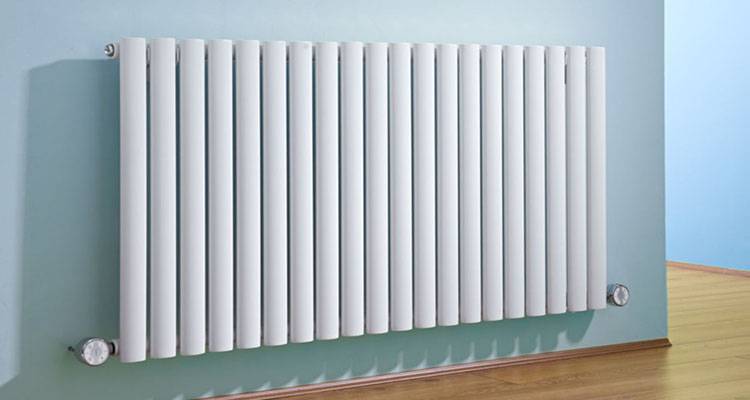
£4,250
Table of Contents
- How Much to Install Central Heating in 2026?
- Supply Cost of Central Heating Installation
- Additional Central Heating Installation Costs
- Labour Cost to Install Central Heating
- What Impacts the Cost of Installing Central Heating?
- What's Involved in Installing New Central Heating?
- Can I Install Central Heating Myself?
- Building Regulations and Planning Permission for Central Heating Systems
- Types of Central Heating
- Cost of Central Heating Removal
- Checklist: Hiring a Central Heating Installer
- FAQs
- Sources
How Much to Install Central Heating in 2026?
Most full central heating installation cost £4,250 on average.
However, installation prices typically range between £3,430 and £5,050, depending on your boiler type, number of radiators, and pipework requirements.
To help you calculate your central heating installation costs, here's how the individual components of your quote will stack up:
Central Heating Installation Prices
| Job Description | Duration | Average Cost |
|---|---|---|
| New boiler (supply and installation) | 0.5 – 1 day | £1,100 – £1,850 |
| Hot water cylinder (supply and installation) | 2 – 3 hours | £180 – £250 |
| 9 Radiators (supply and installation) | 1 – 2 days | £1,200 – £1,750 |
| Pipework (supply and installation) | 3 – 5 days | £950 – £1,200 |
| Total for all above | 4 – 8 days | £3,430 – £5,050 |
What's Usually Included In My Quote?
Typically, all parts of the job - from supply to labour and installation - will be included in the total price your central heating installer quotes you:
- Boiler supply and install
- Radiator supply and install
- Pipework and connections
- System filling, bleeding, and commissioning
- Safety checks and certification

Here's what's usually not included:
- Re-plastering and making good/decorating
- Re-fitting flooring
- Electrical upgrades (e.g., new consumer box)
- Adding smart home features (e.g., installing smart thermostats)
Being armed with this knowledge when collecting quotes helps you to get the best picture possible.
How much does it cost to replace a gas back boiler and fire with a new heating system, including a combi or condenser boiler and 7 radiators, in a terraced house with an attic?
What Impacts Central Heating Installation Costs?
The main cost factor is the type and brand of boiler.
The number of radiators you have installed or upgraded will also add to your overall costs.
For non-variable costs, your location in the UK will have a price bearing (those in London and surrounding areas will pay more than those in the north of the UK). How easy it is to access the installation area will also raise or lower your overall project fee.
With all this in mind, no two central heating installation jobs are the same.
Now, let's take a closer look at how different supplies can impact your overall costs.
Supply Cost of Central Heating Installation
| Job Item | Average Cost |
|---|---|
| Combi boiler | £600 – £2,300 |
| Electric boiler | £1,700 – £2,850 |
| System boiler | £1,150 – £2,850 |
| Conventional boiler | £450 – £1,750 |
| Central heating radiator | £50 – £120 |
| Column radiator | £150 - £800 |
| Designer radiator | £200 - £700+ |
| Cast iron radiator | £200 - £700+ |
| Hot water cylinder | £120 – £230 |
| Pipework | £350 – £700 |
Additional Central Heating Installation Costs
Let's take a look at some different scenarios to see what additional central heating costs you may encounter:
Moving into an Older Property Without Working Central Heating
Potentially, the most expensive scenario is moving into an older property without working central heating.
In this case, you'll need to budget for the cost of new boiler installation, which is around £2,400, depending on your boiler type.
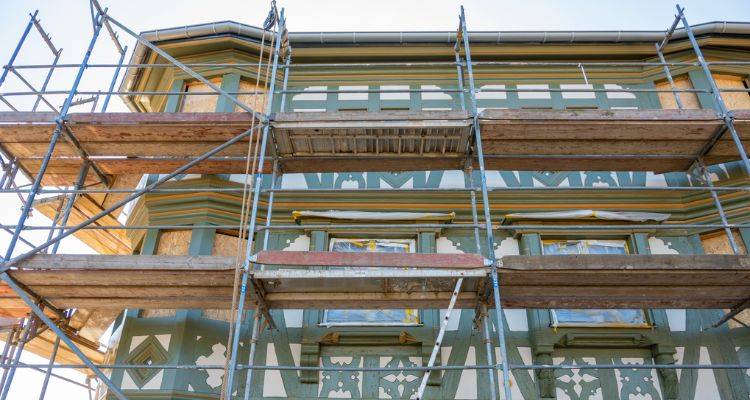
You'll then need to add in the cost of new radiators, typically around £200 per radiator, to cater for the house size and your heat requirements.
If the property has had central heating in the past, but it's been left unused for years and no longer works, it's important to factor in the cost of a powerflush, which is around £400, to rid the pipes of any built-up sludge and debris from previous use to ensure your new system works efficiently.
Renovating or Extending a Home
On top of buying a new boiler to cope with the additional energy output and disposing of the old one, you'll need to add in the cost of moving radiators into your budget if you want to re-use what you already own. The cost of moving radiators is around £275.

You may also want to improve your home's insulation, add other heating options, such as underfloor heating, or improve your home's window efficiency to ensure no heat is lost.
Underfloor heating costs around £800, which is a higher up-front cost compared to moving radiators, but typically has lower running costs as the system can operate at lower temperatures, which can reduce overall energy costs.
Replacing Boiler Like-For-Like
One of the lowest-cost options when it comes to central heating installation is swapping your old boiler like-for-like with a newer, more efficient model of the same fuel type.
If your existing boiler is a system or regular/conventional, you may also want to budget in the cost of a new immersion heater to improve your system if you've been suffering with inefficient heating, corrosion, or lack of hot water. New immersion heaters cost in the region of £133.
Switching Energy Type
There are lots of reasons you may want to change your energy type, from environmental concerns to access issues, or simply to have lower running costs.
Air source heat pumps cost £8,000 to install, while ground source heat pumps cost £13,500 to install.

Depending on the nature of your change, you'll encounter different additional costs. For example, if you're moving away from gas and want to switch to air source or ground source heat pumps, you'll need to get your property suitable for the new heat source.
This can include:
- Improving Your Home's Insulation - Heat pumps have lower flow temperatures compared to gas boilers, so if your home isn't properly insulated, you'll lose the majority of the heat, so you may want to budget for additional cavity wall insulation.
- Having Adequate Radiators/Underfloor Heating - Due to the lower flow temperatures, you'll need to ensure you've got enough radiators/underfloor heating to heat your home and give off enough heat adequately.
- Electrical Upgrades/Rewiring - You may need to invest in a few electrical upgrades to avoid overloading your electrical system, such as the cost of a new consumer unit.
Labour Cost to Install Central Heating
The average cost to hire a plumber is around £170 to £310 per day.
A central heating installation job is considered a large undertaking and often requires the services of more than one plumber to complete:
- For a complete new central heating installation, the labour costs will usually fall somewhere between £1,200 and £2,400 for the full job.
- Depending on the type and difficulty of the job, it typically takes 4 to 8 days to complete.
You will usually receive a quote for the entire job, including the cost of labour for every central heating expert who is involved in the job.
It's good to note that those located in London can expect to pay around £250 to £550 more for the total cost of labour for the job compared to those located in the north or other parts of the UK.
What Impacts the Cost of Installing Central Heating?
There are a number of different things that can affect the overall cost of your central heating installation job:
Type of Boiler
You can expect to pay different costs depending on the type of boiler that you have installed, as well as the manufacturer of the boiler.
Combi boiler prices are between £600 and £2,300 for the boiler alone.
For a system boiler, this could cost £1,150 to £2,850, and for a conventional boiler, you would be looking at costs of around £450 to £1,750.
Number of Radiators
The number of radiators in your system can affect the cost of the installation.
You will need to pay for the materials for each of the different radiators, and you will also need to pay for the labour of installing each additional radiator.

In short: the more radiators you install in your heating system, the more you can expect your job to cost.
Hot Water Cylinder
A system or regular boiler will require a hot water cylinder installation. This is where the hot water is stored and heated before being delivered to the hot water outlets.
A new hot water cylinder typically costs between £230 to £575, including the cost of installation.
Location of Property
The location of your property can affect the amount you pay for your central heating installation, as labour costs in London are considerably higher.
Those located in London can expect to pay around £250 to £550 more for the total cost of labour for the job compared to those located in the north or other parts of the UK.
What's Involved in Installing New Central Heating?
Installing a central heating system is a complex procedure and requires knowledge of how to build and put together several different components.
For this reason, homeowners choose to hire heating engineers to carry out the work safely and efficiently. MyJobQuote lets you request multiple quotes from local central heating installers with one quick and easy request.
If you'd like an idea of how central heating is installed, keep reading:
Before the Job
- Fuel Type and Boiler Chosen - Your heating engineer will help you choose the type of boiler and radiators that best suit your energy usage and fuel type.
- Boiler Position Chosen - Your heating engineer will then find the best location for the new boiler (usually found in kitchens, utility rooms, or bathrooms).

During the Job
- Boiler Installed - The heating engineer will install your new boiler, be that a like-for-like swap, or a brand new installation.
- Radiators Fitted - Once the boiler is fitted, the engineer will move on to fit the radiators, either upgrading existing ones or adding brand new units.
- Pipework Installed - New pipework will be run throughout the property, and will be connected to the boiler's valves, the radiators, and the hot water cylinder if your engineer is fitting a system or regular boiler.
- System Refilled and Bled - Your engineer will then ensure all the radiator valves are closed and the vents are sealed before filling the system with water. They will then bleed each radiator to remove as much air as possible from the system.
- Safety Checks - Your engineer will then check for leaks and make sure the pressure is correct.

After the Job
- Boiler Switched On and System Balanced - Once complete, the engineer will switch on the boiler to heat the water. They'll then go around each radiator in your home and balance out the flow of hot water using the valves.
- Handover - You'll then be handed certification or warranty documents, and shown how to use your new system.

Central heating installation should only be carried out by a qualified professional to ensure safety.
As we need a new central heating system, should we switch to underfloor heating rather than replace the radiators? What's more cost-effective?
Can I Install Central Heating Myself?
No - you should only hire a qualified engineer to install your central heating system, rather than attempting to DIY.
Attempting to install a gas boiler without any knowledge or training is dangerous and illegal in the UK.
Building Regulations and Planning Permission for Central Heating Systems
Building Regulations
Any work to install a new boiler needs building regulations approval due to the safety issues that are involved, plus the need for energy efficiency.
The best way to approach the job is to hire a professional who is certified to perform the task.
Your heating engineer must be qualified relative to your fuel type:
- For gas boilers, this means a Gas Safe registered engineer.
- For oil boilers, this means using an OFTEC-registered installer.
- For electric boilers, this means using a qualified electrician who can self-certify under Part P of the Building Regulations.
Your heating engineer will need to self-certify compliance:
- Part L (Energy Efficiency)
- Part P (Electrical Safety)
- Part J (Combustion and Ventilation
The bottom line: The contractor you hire must know what they need to do to comply with building regulations when it comes to installing your new central heating system.
I'm looking to buy a property with a back boiler and want to know the likely cost of removing it and replacing it with a combi boiler. I understand costs vary but the back boiler is behind the lounge fireplace and I’d want the new one installed in the kitchen.
Planning Permission
Typically, you won't require planning permission when installing a new central heating system if the work is internal.
However: The following may lead you to require planning permission:
- If your central heating work includes external elements - such as a new flue, or external storage tanks - planning permission may be needed.
- If you live in a listed building or within a conservation area, you may need to check with your local planning authority before going ahead with the work.
A qualified contractor can usually give you the best advice when it comes to the rules and regulations needed to carry out a new central heating system installation.
Types of Central Heating
Struggling to choose between central heating types?
Your choice is based on two things:
- The type of boiler system
- The fuel the boiler runs on
Below, you'll find an explanation of the most common types of boilers and heating systems, together with their fuel options, to give you a comprehensive overview of what's suitable for you.
Combi Boiler Cost
What Is It? A combi boiler (or combination boiler) is an all-in-one unit that provides your home with hot water and heat.
How Does It Work? Combi boilers connect directly to the mains water supply, meaning there's no need for a separate hot water cylinder or cold water tank, making them popular choices for UK homeowners who are low on space.
How Much? The typical cost of a combi boiler is between £600 to £2,300, depending on make, model, and output.

Pros
- ✔ Small, space-saving design
- ✔ Hot water on demand
- ✔ Energy-efficient by design as water is only heated when needed
Cons
- ✖ Not a great fit for large homes with multiple bathrooms
- ✖ If there's increased demand for hot water, the water flow may be reduced
- ✖ If there's a drop in your mains water pressure, your system will be impacted
System Boiler Cost
What Is It? System boilers don't need a separate cold water tank, and can take water directly from the mains, which allows them to cope much better with high hot water demands compared to a combi boiler.
How Does It Work? They use a hot water cylinder to heat and supply hot water to your home.
How Much? The typical cost of a system boiler is between £1,150 to £2,850.

Pros
- ✔ Capable of dealing with high hot water demands
- ✔ No need for a cold water tank, saving interior space
- ✔ Typically more efficient than other boiler types
Cons
- ✖ Needs a hot water cylinder, taking away some internal house space
- ✖ Installation is more complex than a combi boiler
- ✖ If the hot water runs out, you'll have to wait for the cylinder to reheat
Regular Boiler Cost
What Is It? Regular boilers - also known as conventional or heat-only boilers - are usually found in older properties and, as a result, are typically less efficient than modern alternatives.
How Does It Work? These boilers work with a hot water cylinder and a cold water tank. Water is heated and stored until needed, meaning multiple taps can run at the same time without a drop in pressure or temperature.
How Much? The typical cost of a regular boiler is between £450 to £1,750, depending on your specifications.
Pros
- ✔ Regular boilers work well in areas with low water pressure
- ✔ Can cope with multiple hot water usage across different bathrooms
- ✔ Good for larger households
Cons
- ✖ Regular boiler setups take up a lot of interior space with a hot water cylinder and a cold water tank
- ✖ Hot water isn't instant
- ✖ Typically less energy-efficient than combi or system boilers
We recently had a combi boiler installed to replace our old conventional one and have since had issues with water pressure and strange noises. The engineer blames old taps, but I’m concerned shortcuts may have been taken during the one-day installation?
Types of Fuel for Central Heating Systems
Once you've chosen your boiler system type, you'll then need to decide what fuel it runs on.
To give you an idea of energy costs, here's the estimated cost per kWh for gas, electric, oil, and solid fuel, along with which boilers the fuel types are compatible with:
| Fuel Type | Average Cost per kWh | Compatible Boilers |
|---|---|---|
| Gas | £0.06 - £0.08 per kWh | Combi, System, Regular |
| Electric | £0.24 to £0.30 per kWh | Electric Combi, System |
| Oil | £0.07 to £0.11 per kWh | System, Regular |
| Solid Fuel | £0.05 - £0.10 per kWh | Biomass Boilers (Log, Coal, Pellets) |
Gas Central Heating Cost
Gas is the most common form of boiler fuel in the UK. It is convenient as it is supplied through mains connections, and can provide homes with heating and hot water.
In 2026, gas typically costs an average of £0.06 to £0.08 per kWh.
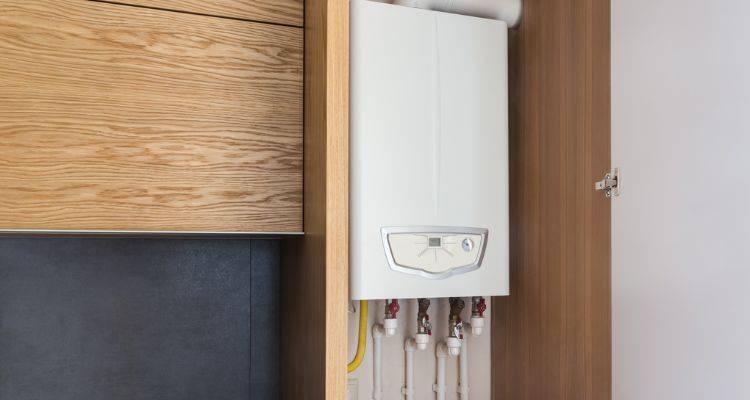
Pros
- ✔ Cost-effective, being one of the cheapest fuel types in the UK
- ✔ Convenient fuel type as most homes are on the gas network
- ✔ Produces a lot of heat quickly
Cons
- ✖ Gas usage isn't environmentally-friendly
- ✖ If your home is rural, you might not have access to a mains gas supply
- ✖ Boilers can be bulky and need external flues
Electric Central Heating Cost
Electric boilers are noiseless and very light compared to other boilers. They also have low maintenance and running costs.
In 2026, electricity costs an average of £0.24 to £0.30 per kWh.
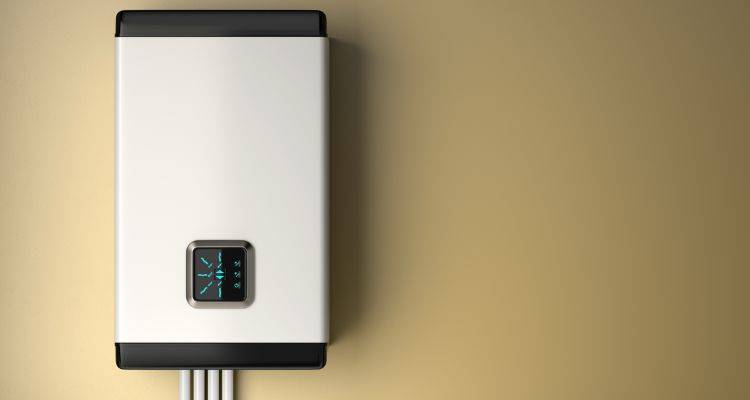
Pros
- ✔ No noise while the boiler is in use
- ✔ Very light and compact design, ideal for small spaces
- ✔ Low maintenance
Cons
- ✖ High running costs, with electricity being the most expensive fuel in our selection
- ✖ Can take longer to heat compared to other fuel types
- ✖ Not suitable for large homes with high hot water demands
Oil Central Heating Cost
Oil is used as a substitute for natural gas in rural and off-grid areas. If you're using oil as a fuel, you must make sure your boiler is capable of running on oil.
In 2026, oil costs an average of £0.07 to £0.11 per kWh.
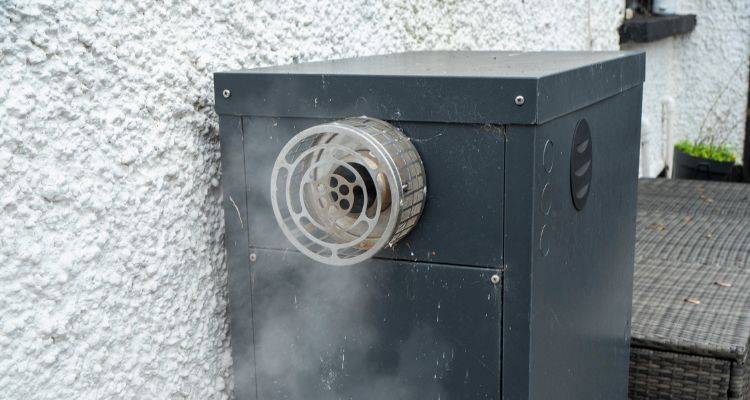
Pros
- ✔ A good substitute for gas for off-grid homes
- ✔ High energy-efficiency
- ✔ Ideal for large homes with high heat demands
Cons
- ✖ You'll need to store your fuel in an external tank somewhere on your property
- ✖ Many boilers aren't compatible
- ✖ Oil prices can fluctuate
Solid Fuel Central Heating Cost
Solid fuels are often the cheapest but are the most polluting form of fuel. The fuel can come in the form of coal, wooden logs, or biomass pellets.
In 2026, solid fuel variants cost between £0.05 to £0.10 per kWh, depending on the exact fuel type.
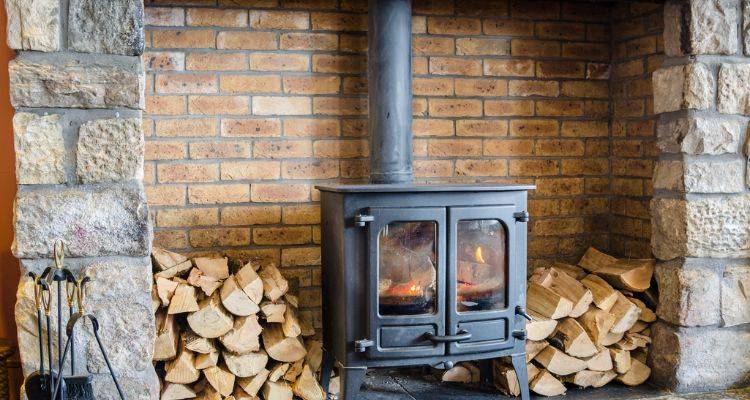
Pros
- ✔ Typically low cost
- ✔ Useful for rural homes without mains gas or electric connections
- ✔ Biomass gives a sustainable fuel option
Cons
- ✖ Not renewable
- ✖ Very polluting, especially if you're using coal
- ✖ Large storage space needed
What are some good examples of alternative systems to central heating?
Cost of Central Heating Removal
You may want to remove your central heating system if you are making way for a new system. In these cases, the job should be completed by a professional central heating remover or installer who has all the knowledge needed to avoid doing any damage to your home in the process.
Hiring a professional to carry out the job of removing your central heating system will usually cost around £120 to £240 per day, and the job will usually take approximately 1 to 2 days to complete.
You may consider hiring more than one contractor for the job if you would like it to be completed more quickly.
Checklist: Hiring a Central Heating Installer
There are a few things you will need to consider before hiring someone to install a new central heating system for you.
Below is a list of some of the main things that you should consider when looking for the right contractor for the job:
- Do they have the right qualifications? Depending on your energy type, make sure your engineer has the correct qualifications. For instance, gas boilers must only be installed by Gas Safe Registered engineers.
- Are they registered with any trade bodies? Such as OFTEC for oil boiler installers, HETAS for solid fuel, Gas Safe Register for gas applications, and NAPIT for electrical installations.
- Have you been given an itemised list of costs? Make sure you request an itemised breakdown of costs so you know exactly what's included, and what's not (e.g., waste removal, skip hire, supply of materials).
- Have you looked at their past projects? If there are any photos or videos of the trader's work, make sure you look over them to see the quality of work you can expect.
- What are their reviews like? Take a look at the engineer's customer reviews on their MyJobQuote profile, and make sure the comments align with what you're looking for.
- Are they insured? Check that the trader has public liability insurance to cover themselves and you in the event of any accidents during the project.
- Do they offer a guarantee or warranty? Be sure to check if your engineer offers a warranty or guarantee on their work on parts and labour.
FAQs
What Temperature Should the Central Heating Thermostat Be Set At?
How Disruptive is a Central Heating Installation?
Does Central Heating Save Money in the Long Run?
Is Central Heating Better for Your Health?
Does Upgrading Central Heating Reduce Emissions?
Will Central Heating Increase the Value of My Home?
Sources
https://www.planningportal.co.uk/permission/common-projects/boilers-and-heating/planning-permission
https://www.stheatingservices.co.uk/types-fuel-used-boiler/










